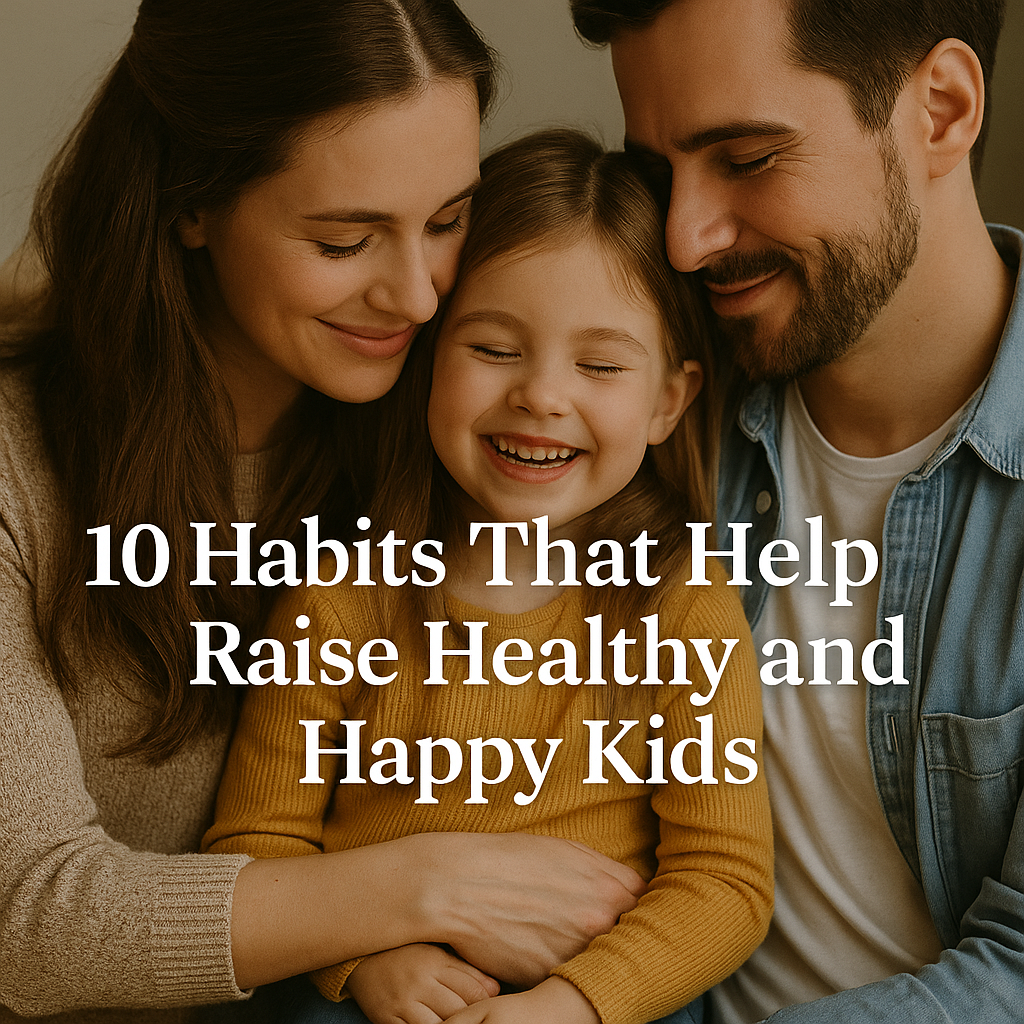Raising a child is one of the most rewarding and demanding responsibilities a person can have. Beyond love and care, children thrive in environments that encourage consistency, positivity, and connection. But how do parents nurture not just physically healthy kids, but also emotionally balanced and happy ones?
While there’s no one-size-fits-all guide to parenting, certain daily habits have been shown to create the conditions for kids to grow up feeling secure, confident, and joyful. In this article, we’ll explore 10 essential habits that can make a real difference in your child’s well-being.
1. Establish a Consistent Routine
Children thrive on predictability. A structured routine provides a sense of security, especially for younger kids who are still learning how the world works.
What to include in a good routine:
- Regular mealtimes
- Set bedtime and wake-up time
- Designated homework/play time
- Daily rituals (like a bedtime story or morning hug)
Consistency doesn’t mean rigidity—it simply helps kids know what to expect, reducing anxiety and promoting emotional stability.
2. Prioritize Quality Sleep
Sleep is crucial for growth, immune health, emotional regulation, and learning. Yet, many children don’t get enough rest.
Tips for healthy sleep habits:
- Create a calming bedtime routine (e.g., bath + book)
- Limit screen time 1 hour before bed
- Keep the bedroom dark and quiet
- Avoid sugary snacks or caffeine before bed
A well-rested child is more likely to be calm, focused, and in a better mood.
3. Encourage Physical Activity Every Day
Active play isn’t just about exercise—it’s also a tool for building confidence, coordination, and resilience.
Simple ways to promote daily activity:
- Go on family walks or bike rides
- Play tag or ball games outside
- Sign them up for a sport or dance class
- Set limits on screen time to encourage movement
Even 30–60 minutes of movement a day can make a big difference in physical and emotional well-being.
4. Make Time for One-on-One Connection
No toy, gadget, or video game can replace the emotional value of your attention. Children feel safe and valued when they get regular, undistracted time with their parents.
Ideas for connection moments:
- Chat during meals
- Read a book together
- Take turns asking questions about the day
- Cook or do crafts as a team
Just 15 minutes of focused attention can significantly boost a child’s sense of love and security.
5. Serve Nutritious, Balanced Meals
A well-balanced diet fuels growing bodies and minds. It also supports emotional regulation and concentration.
Basic nutrition tips:
- Offer a variety of colorful fruits and vegetables
- Include whole grains and healthy fats
- Avoid processed snacks with high sugar or sodium
- Involve kids in grocery shopping or meal prep
When children learn to enjoy real, healthy food from a young age, they’re more likely to make smart choices as they grow.
6. Teach Emotional Expression
Helping your child understand and express their emotions is a major step toward emotional intelligence and long-term happiness.
Ways to build this habit:
- Use simple phrases like, “It’s okay to feel sad/angry.”
- Model calm responses to frustration
- Teach breathing techniques or calming strategies
- Label emotions during daily experiences
When kids can name and navigate their feelings, they’re better equipped to handle stress and conflict.
7. Set Clear and Fair Boundaries
Children need boundaries to feel safe and to understand what’s expected of them. Discipline doesn’t mean punishment—it means guidance.
Effective boundary-setting:
- Explain rules calmly and clearly
- Be consistent in enforcing limits
- Offer choices when possible
- Use natural consequences to teach responsibility
Boundaries help kids develop self-control and respect—for themselves and others.
8. Model Positive Behavior
Children learn more from what we do than what we say. Parents who demonstrate kindness, patience, and honesty are teaching through action.
Lead by example in:
- Managing anger or disappointment
- Apologizing when wrong
- Showing empathy to others
- Practicing gratitude
Your everyday behavior becomes their blueprint for navigating life.
9. Celebrate Effort, Not Just Achievement
Praising effort encourages a growth mindset—the belief that abilities can improve with time and practice.
Try to say:
- “I’m proud of how hard you worked.”
- “That took courage. Well done.”
- “You kept trying even when it was hard.”
Kids who feel safe to fail and try again are more resilient and motivated in the long run.
10. Create a Positive Home Environment
A peaceful, supportive home atmosphere contributes to a child’s sense of stability and happiness.
Elements of a nurturing home:
- Mutual respect among family members
- Time for fun and laughter
- Safe spaces for rest and play
- Open communication without fear of punishment
Even in moments of conflict, aim to maintain a tone of love and understanding.
Final Thought: Little Things, Big Impact
Healthy and happy kids aren’t the result of one big parenting decision—but of countless little ones made every day. The habits you choose to build into your family’s routine shape the emotional, mental, and physical development of your child.
Start small. Choose one or two habits from this list and focus on building consistency. Over time, they’ll become part of your family’s rhythm—creating a home where your child can truly thrive.
In parenting, perfection isn’t the goal. Presence, love, and intentional habits are what matter most.
